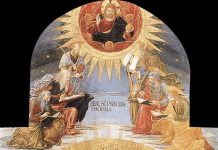On February 10th in Malta and Gozo we celebrate the feast when St Paul, our father in faith, has been shipwrecked. This dramatic event was surely a visible sign of God’s grace since the Maltese Islands received the gift of faith.
Much has happened in Malta during these two millennia since St Paul came to us. These Islands experienced a series of dominating powers and all kinds of rulers. On them lived hosts of people coming from practically every corner of the world. What remained out of all this is the gift of Christian faith, this priceless gift which singles us out from other people. When visiting Malta in 2010 in his apostolic journey to Malta on the occasion of the 1950th anniversary of St Paul’s shipwrecked on the Island during his homily on the third Sunday of Easter on 18 April 2010 at the Floriana Grananries, Pope Benedict highlighted this fact very powerfully:
Of all the gifts brought to these shores in the course of your people’s history, the gift brought by Paul was the greatest of all, and it is much to your credit that it was immediately accepted and treasured. Għożżu l-fidi u l-valuri li takom l-Appostlu Missierkom San Pawl (Preserve the faith and values transmitted to you by your father the Apostle Saint Paul). Continue to explore the richness and depth of Paul’s gift to you and be sure to hand it on not only to your children, but to all those you encounter today. No visitor to Malta could fail to be impressed by the devotion of your people, the vibrant faith manifested in your feast-day celebrations, the beauty of your churches and shrines. But that gift needs to be shared with others, it needs to be articulated. As Moses taught the people of Israel, the words of the Lord “shall be upon your heart, and you shall teach them diligently to your children, and shall talk of them when you sit in your house, and when you walk by the way, and when you lie down and when you rise” (Deut 6:6-7). This was well understood by Malta’s first canonized Saint, Dun Ġorġ Preca. His tireless work of catechesis, inspiring young and old with a love for Christian doctrine and a deep devotion to the Incarnate Word of God, set an example that I urge you to maintain. Remember that the exchange of goods between these islands and the world outside is a two-way process. What you receive, evaluate with care, and what you have that is of value, be sure to share with others.
But what kind of faith do we share as Maltese with other people? From his vast teachings St Paul gives us some very salient and valid examples of this faith which is so relevant both in Malta as well as beyond it. To begin with, we Maltese are responsible to convey the very urgent message that our body is the temple of the Holy Spirit and never to be used as a vehicle for sin. St Paul rightly challenges us: Shun immorality. Every other sin which a man commits is outside the body; but the immoral man sins against his own body. Do you not know that your body is a temple of the Holy Spirit within you, which you have from God? You are not your own; you were bought with a price. So glorify God in your body (1 Cor 6:18-20).
Secondly, through the life example and teachings of our father in faith we are responsible to accentuate the working of the Holy Spirit in our lives. St Paul explains this wonderfully in his letter to the Galatians where he writes: But I say, walk by the Spirit, and do not gratify the desires of the flesh. For the desires of the flesh are against the Spirit, and the desires of the Spirit are against the flesh; for these are opposed to each other, to prevent you from doing what you would. But if you are led by the Spirit you are not under the law. Now the works of the flesh are plain: fornication, impurity, licentiousness, idolatry, sorcery, enmity, strife, jealousy, anger, selfishness, dissension, party spirit, envy, drunkenness, carousing, and the like. I warn you, as I warned you before, that those who do such things shall not inherit the kingdom of God. But the fruit of the Spirit is love, joy, peace, patience, kindness, goodness, faithfulness, gentleness, self-control; against such there is no law (Gal 5:16-23).
It is when the Spirit is in control of our lives that we can effectively love one another the way Jesus wants us to love. Jesus’ love is not theoretical but always very concrete. The Letter to the Romans is so clear about this point when it says: Let love be genuine; hate what is evil, hold fast to what is good; love one another with brotherly affection; outdo one another in showing honor. Never flag in zeal, be aglow with the Spirit, serve the Lord. Rejoice in your hope, be patient in tribulation, be constant in prayer. Contribute to the needs of the saints, practice hospitality. Bless those who persecute you; bless and do not curse them. Rejoice with those who rejoice, weep with those who weep. Live in harmony with one another; do not be haughty, but associate with the lowly; never be conceited. Repay no one evil for evil, but take thought for what is noble in the sight of all. If possible, so far as it depends upon you, live peaceably with all. Beloved, never avenge yourselves, but leave it to the wrath of God; for it is written, “Vengeance is mine, I will repay, says the Lord.” No, “if your enemy is hungry, feed him; if he is thirsty, give him drink; for by so doing you will heap burning coals upon his head.” Do not be overcome by evil, but overcome evil with good (Rom 12:9-21).
In his letter to the Ephesians St Paul keeps harping on the same point when he exhorts us: Therefore, putting away falsehood, let every one speak the truth with his neighbor, for we are members one of another. Be angry but do not sin; do not let the sun go down on your anger, and give no opportunity to the devil. Let the thief no longer steal, but rather let him labor, doing honest work with his hands, so that he may be able to give to those in need. Let no evil talk come out of your mouths, but only such as is good for edifying, as fits the occasion, that it may impart grace to those who hear. And do not grieve the Holy Spirit of God, in whom you were sealed for the day of redemption. Let all bitterness and wrath and anger and clamor and slander be put away from you, with all malice, and be kind to one another, tenderhearted, forgiving one another, as God in Christ forgave you (Eph 4:25-32).
Finally, from his precious instruction St Paul is showing us the mission as Maltese to share our faith with others through the Bible and the Sacred Tradition of the Church. In his letter to the Corinthians he gives us this very valid insight: Put on then, as God’s chosen ones, holy and beloved, compassion, kindness, lowliness, meekness, and patience, forbearing one another and, if one has a complaint against another, forgiving each other; as the Lord has forgiven you, so you also must forgive. And above all these put on love, which binds everything together in perfect harmony. And let the peace of Christ rule in your hearts, to which indeed you were called in the one body. And be thankful. Let the word of Christ dwell in you richly, teach and admonish one another in all wisdom, and sing psalms and hymns and spiritual songs with thankfulness in your hearts to God. And whatever you do, in word or deed, do everything in the name of the Lord Jesus, giving thanks to God the Father through him (Col 3:12-17).
I am sure that this mission is not merely given to the Maltese people but to all those who have chosen Christ to be the Lord of their lives. So today, as we are celebrating the feast day when St Paul was shipwrecked on Malta let us let this great apostle of the Gentiles help us relive the life of Christ in our own lives.
Is this not the most effective way of presen[ting] []our bodies as a living sacrifice, holy and acceptable to God, which is []our spiritual worship (Rom 12:1) to him, and through him to others as well?











